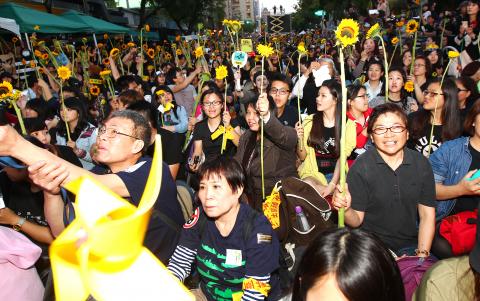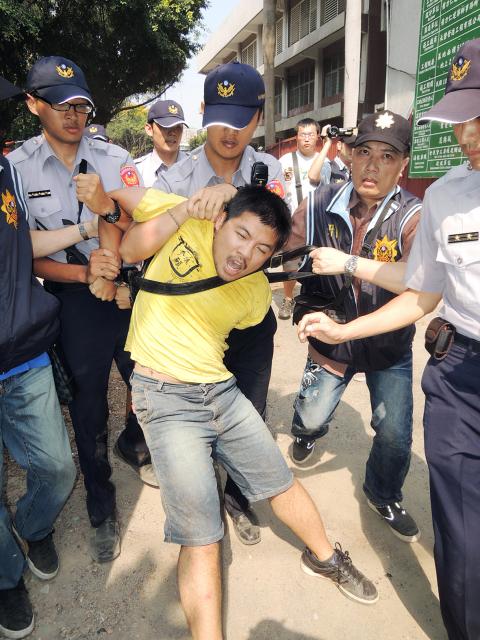When Wang Chung-ming (王鐘銘) called on the government to halt the demolition of a military veterans community in 2013, he was charged with obstructing official duties because he scuffled with police. He was found guilty and sentenced to three months in jail.
Later that same year, the Green Party activist was arrested and sentenced to another three months in jail for clashing with police during a protest against the removal of trees for a public construction project.
“I was surprised to learn that I was found guilty,” Wang said of the court’s unusual decision to jail a protester. “Nobody saw it coming.”

Photo: Chen Kuan-pei, Taipei Times
Wang’s legal problems illustrate how authorities have used the law in recent years to suppress protests. Whereas police once relied on the Assembly and Parade Act (集會遊行法) to silence dissent, today they are employing other criminal charges to regulate protests. Legal activists have raised concern over police misusing the legal system, as a growing number of protesters are arrested and charged for acts as innocuous as throwing a piece of paper at the police during demonstrations.
LAW IN TRANSITION
Under the Assembly and Parade Act, protesters require permission in advance from the police for rallies and demonstrations. However, the law, created one year after martial law was lifted in 1987, does more to infringe on human rights than protect them.

Photo: Lee Hsin-fang, Taipei Times
“Although martial law ended almost 30 years ago, authoritarian thinking has survived Taiwan’s democratization. From the police to judges, the fundamental right to peacefully assemble is still deemed to be a threat to social order,” says Kao Yung-cheng (高涌誠), a human rights attorney and advocate.
A legal case in 2009 eventually led to the Council of Grand Justices to issue Constitutional Interpretation No. 718 last March, which ruled that provisions of the act are unconstitutional.
The Supreme Court’s interpretation has had a direct impact on police and prosecutors, who now rely on sections of the Criminal Code (刑法) — illegal entry into a building, obstructing official duties, insulting a public official — in an attempt to curb demonstrations.
Chen Yu-fan (陳雨凡), deputy executive director of the Judicial Reform Foundation (民間司法改革基金會), says that these laws are being used in an arbitrary and trivial manner.
Chen cites as an example the arrest of a student who threw the sleeve of a coffee cup at police during an anti-nuclear protest last April.
“A push or a nudge can lead to arrest for obstructing public duties. It is rather absurd to think that peaceful, unarmed demonstrators can pose a threat to large numbers of police and stop them from executing their duties,” Chen says.
In the study Criminal Risk Management for Assembly and Parade (集會遊行的刑事風險管理), human rights lawyer Tsai Ya-ying (蔡雅瀅) reveals that it is not only protesters who think the laws are absurd.
“Even the police officers I interviewed think... demonstrators are punished too harshly,” Tsai says.
UNDER PROSECUTION
Human rights activists worry that criminalizing protests will likely discourage and intimidate people from participating in public demonstrations.
“Not many people can handle the pressure of being tangled in litigation for a long time. I’ve seen students unable to study abroad because they have to go to court. It definitely has a coercive effect on protesters,” says Chen.
Chen gives as an example the Sunflower movement, a mass protest that began in March 2014 to stop the legislature from passing a contentious cross-strait service trade agreement. More than 200 students and activists were indicted for occupying the main legislative chamber and sieging the Executive Yuan.
Though legal activists expect a decrease in the number of arrests when president-elect Tsai Ing-wen (蔡英文) assumes office in May, Chen says the test will be in how police deal with protesters on the ground.
Hsu Jen-shou (許仁碩), a legal specialist from the Taiwan Association for Human Rights (台灣人權促進會), agrees, adding that the police and prosecutors have their own own “bureaucratic habits.”
“We will continue to monitor the new government and see if it makes policy decisions that respect the voice of the people, and if the Tsai-led Democratic Progressive Party will amend or abolish problematic laws,” Hsu says.
Wang started his second three-month sentence last month, following his imprisonment earlier this year associated with the tree-sitting protest on campus.

April 14 to April 20 In March 1947, Sising Katadrepan urged the government to drop the “high mountain people” (高山族) designation for Indigenous Taiwanese and refer to them as “Taiwan people” (台灣族). He considered the term derogatory, arguing that it made them sound like animals. The Taiwan Provincial Government agreed to stop using the term, stating that Indigenous Taiwanese suffered all sorts of discrimination and oppression under the Japanese and were forced to live in the mountains as outsiders to society. Now, under the new regime, they would be seen as equals, thus they should be henceforth

With over 100 works on display, this is Louise Bourgeois’ first solo show in Taiwan. Visitors are invited to traverse her world of love and hate, vengeance and acceptance, trauma and reconciliation. Dominating the entrance, the nine-foot-tall Crouching Spider (2003) greets visitors. The creature looms behind the glass facade, symbolic protector and gatekeeper to the intimate journey ahead. Bourgeois, best known for her giant spider sculptures, is one of the most influential artist of the twentieth century. Blending vulnerability and defiance through themes of sexuality, trauma and identity, her work reshaped the landscape of contemporary art with fearless honesty. “People are influenced by

Last week, the the National Immigration Agency (NIA) told the legislature that more than 10,000 naturalized Taiwanese citizens from the People’s Republic of China (PRC) risked having their citizenship revoked if they failed to provide proof that they had renounced their Chinese household registration within the next three months. Renunciation is required under the Act Governing Relations Between the People of the Taiwan Area and the Mainland Area (臺灣地區與大陸地區人民關係條例), as amended in 2004, though it was only a legal requirement after 2000. Prior to that, it had been only an administrative requirement since the Nationality Act (國籍法) was established in

The remains of this Japanese-era trail designed to protect the camphor industry make for a scenic day-hike, a fascinating overnight hike or a challenging multi-day adventure Maolin District (茂林) in Kaohsiung is well known for beautiful roadside scenery, waterfalls, the annual butterfly migration and indigenous culture. A lesser known but worthwhile destination here lies along the very top of the valley: the Liugui Security Path (六龜警備道). This relic of the Japanese era once isolated the Maolin valley from the outside world but now serves to draw tourists in. The path originally ran for about 50km, but not all of this trail is still easily walkable. The nicest section for a simple day hike is the heavily trafficked southern section above Maolin and Wanshan (萬山) villages. Remains of